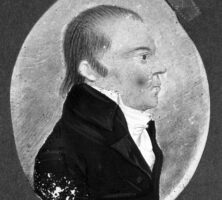The highest-ranking Jewish officer on the colonial side during the Revolutionary War (1775-83), Mordecai Sheftall was also successful as a merchant and shipper and as a soldier and statesman. A highly visible participant in civic activities, he was consistently recognized for his talents by authorities at every level of society and government.
He was born in Savannah on December 2, 1735, to Perla and Benjamin Sheftall, who had arrived in the Georgia colony, along with about forty other Jewish immigrant families, in 1733. They sailed on the William and Sarah from London, England, and the Sheftalls were founding members of Congregation Mickve Israel. Sheftall was only eleven years old when his formal education ended, for lack of schools. By the time he was seventeen, he had begun what was to be a highly successful career as a merchant, buying and tanning deerskins to sell at a profit. When he was just eighteen years old, he had accumulated enough money to purchase fifty acres in Vernonburg, near Savannah.
Throughout his life, Sheftall speculated in real estate. His pre-Revolution holdings were immense. Well-connected with friends and family in mercantile and shipping in England; the Caribbean; Charleston, South Carolina; and Philadelphia, Pennsylvania, he developed a network of contacts to help build up his own business by his mid-twenties. Sheftall married Frances Hart, the sister of one of his Charleston merchant contacts, in 1761. The couple had six children, all but one living to adulthood. A year after their marriage, they owned 1,000 acres of land and nine enslaved laborers. Sheftall took up cattle ranching, acquiring another 1,000 acres in St. George Parish (later Burke County) in 1767 for grazing and timber harvesting. The cattle business led to his building a tanning facility with his half-brother Levi, and in 1768 the Georgia Houses of Assembly appointed him Inspector of Tanned Leather for the Port of Savannah.

Sheftall was an Orthodox Jew, recognized by his fellow congregants in Savannah as an outstanding leader. In 1772 he donated one and a half acres of land for the establishment of Georgia’s first large Jewish cemetery. Known familiarly as the Sheftall Cemetery until the mid-1800s, it was open to all Jews in good standing with their community. For decades he also took an active part in the charitable Union Society, an ecumenical organization in Savannah whose efforts included support and guidance of the town’s Bethesda orphanage.
Sheftall also had a high profile among Savannah colonists objecting to Britain’s Stamp Act. Angered by it and other moves that were to lead to the colonial revolt of 1776, Sheftall joined the Savannah Parochial Committee, a group of townspeople calling for American independence. He was elected its chairman for a term, evidence of his good reputation among his peers, both Jew and non-Jew. In the civic confusion preceding the Revolution, the parochial committee took upon itself such functions as enforcing embargoes on molasses, corn, and enslaved workers.
After hostilities began, Sheftall was appointed in 1777 as deputy commissary general to the Continental troops in South Carolina and Georgia as well as commissary general of Georgia troops. Major General Robert Howe, Continental commander for the Southern Department, commissioned him a colonel in connection with these duties, thus making him the highest-ranking Jewish officer on the American side. He in turn appointed his teenaged eldest son, Sheftall Sheftall, as his assistant.
Finding that neither Georgia nor the Continental Congress had the necessary resources, Sheftall used his own personal funds to care for the men he led and made sizable loans to authorities to pay for munitions, food, uniforms, and horses. He also invested heavily in Georgia notes and bonds, which became worthless after the war’s end. In late December 1778 Sheftall and his eldest son were taken prisoner and eventually sent to Antigua, in the Caribbean, from which he wrote to the Continental Congress, entreating them to arrange a prisoner exchange in 1780. Unable yet to return to Georgia, father and son lived first in New York, then in Philadelphia.
Sheftall’s loans to Georgia and the Continental Congress were never repaid, despite his frequent attempts at redress. During his time as a prisoner of war, most of his property was seized by the British, never to be returned to him. Financially ruined by the Revolution, Sheftall began a new shipping business from a rented office in Philadelphia. Among other activities, he attempted privateering, purchasing a schooner in 1781 with borrowed funds. The endeavor collapsed when the captains of the vessel proved unreliable.
His own reputation for trustworthiness and leadership continued unsullied, however, and in the same year as his failed privateering venture, the newly constituted state of Georgia appointed him Agent for the State of Georgia for Purchasing Clothing. A year later he was called to take the stand as witness for the government when General Howe was court-martialed by the Continental Congress for failing to defend Savannah against attack in 1778. Returning to Savannah in late 1782, he reentered local civic and religious activities and was elected by the city’s synagogue, Congregation Mickve Israel, to its board of directors. He led the synagogue in its successful petition for an official charter from the state in 1790, and a year later he began a five-year term as president of the congregation.
Sheftall died on July 6, 1797, never having recouped his pre-Revolution financial standing but having lived a life of great utility and influence, both to his local community and to the newly founded United States of America.






